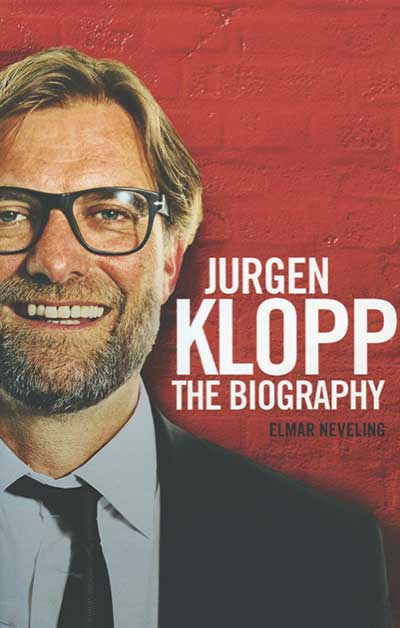 by Elmar Neveling
by Elmar Neveling
Ebury Press, £12.99
Reviewed by Rob Hughes
From WSC 351 May 2016
Attempting to write a biography of someone with an ongoing career means that your work is never quite done. As a contributor to DFB Bundesliga magazine, Elmar Neveling has been well placed to chart the rise of Jürgen Klopp over the past decade. A book published in Germany in 2011 Echte Liebe (Real Love) brought Klopp’s achievements with Borussia Dortmund into some kind of focus, but landed between back-to-back Bundesliga titles. A new version, published four years later, was able to evaluate his achievements (including the German double and reaching a Champions League final) from a better perspective. Klopp’s decision to cut short his post-Dortmund sabbatical has now necessitated an extra chapter in this English version of the book, probably earlier than Neveling anticipated, to cover the start of his Liverpool tenure.
Reflecting the in-progress nature of Klopp’s professional life, the author never quite gets a full grip on his subject. There’s very little about his personal life or the forces that make him such a charismatic figure, but lots of detail about tactics and strategy, piled high with statistical data. And while Neveling has gained access to sundry commentators and ex-colleagues, Klopp himself doesn’t contribute to the book. All of which makes it long on facts and short on revelation.
That said, it’s often an entertaining read. Klopp has an easy turn of phrase and a disarming eloquence, with Neveling pulling quotes from various sources. Taking over as manager of relegation-threatened Mainz in 2001, having played for them for over a decade, Klopp observed that “as regards confidence, they were pleased with themselves if they managed to find their way to the stadium without getting lost”.
He likens his outbursts to an overheating boiler, occasionally reaching extreme levels. Piqued by a cup defeat to Bayern Munich while at Dortmund, having beaten them in recent encounters, Klopp accused his rivals of co-opting his tactics. “Bayern are like the Chinese in industry,” he railed during a press conference. “They see what others are doing and copy it, so they can follow the same plan with more money and a different set of players.” By his own admission, too, Klopp wasn’t particularly noteworthy in his playing days, making up with dogged perseverance what he lacked in ability. At one point he even wonders if he would have been better off in England: “Pump it into the mixer and then get your head on it.”
Where the book really succeeds is in its drawing of parallels between Dortmund and Liverpool. When Klopp took over at Dortmund in 2008, he found a damaged club with great potential, languishing mid-table. (Dortmund had, in fact, been on the verge of bankruptcy only a few years earlier, rescued in part by – staggering as it seems – a €2 million (£1.6m) loan from Bayern.) His promise of “full-throttle football” at Dortmund, the implementation of the pressing game and the importance of fast transitions are all things he’s vowed to repeat at Anfield. Whether or not he achieves his aim remains to be seen. Perhaps only then will we be able to gain the full measure of Klopp the man, rather than just the enigma.